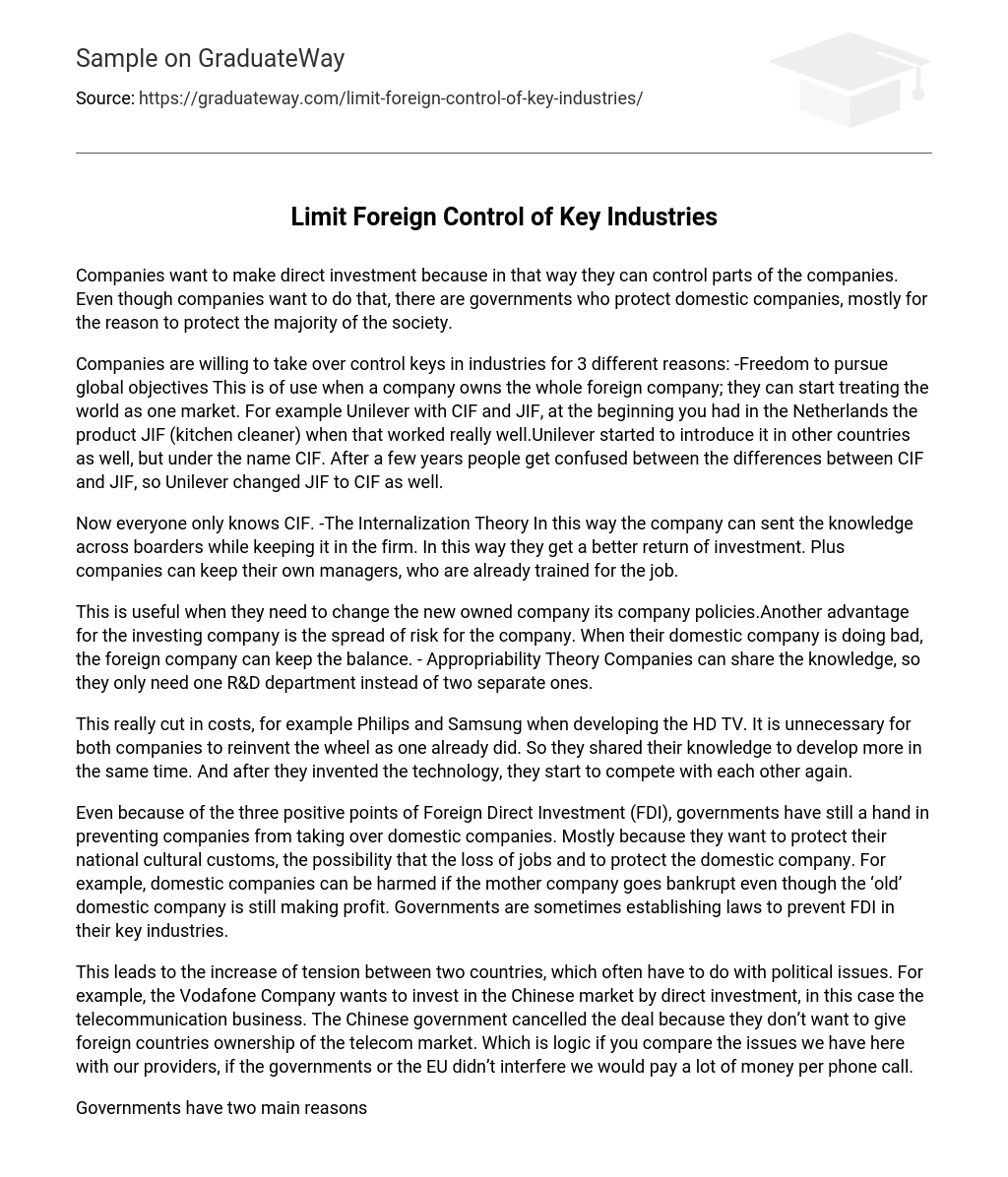Companies want to make direct investment because in that way they can control parts of the companies. Even though companies want to do that, there are governments who protect domestic companies, mostly for the reason to protect the majority of the society.
Companies are willing to take over control keys in industries for 3 different reasons: -Freedom to pursue global objectives This is of use when a company owns the whole foreign company; they can start treating the world as one market. For example Unilever with CIF and JIF, at the beginning you had in the Netherlands the product JIF (kitchen cleaner) when that worked really well.Unilever started to introduce it in other countries as well, but under the name CIF. After a few years people get confused between the differences between CIF and JIF, so Unilever changed JIF to CIF as well.
Now everyone only knows CIF. -The Internalization Theory In this way the company can sent the knowledge across boarders while keeping it in the firm. In this way they get a better return of investment. Plus companies can keep their own managers, who are already trained for the job.
This is useful when they need to change the new owned company its company policies.Another advantage for the investing company is the spread of risk for the company. When their domestic company is doing bad, the foreign company can keep the balance. – Appropriability Theory Companies can share the knowledge, so they only need one R&D department instead of two separate ones.
This really cut in costs, for example Philips and Samsung when developing the HD TV. It is unnecessary for both companies to reinvent the wheel as one already did. So they shared their knowledge to develop more in the same time. And after they invented the technology, they start to compete with each other again.
Even because of the three positive points of Foreign Direct Investment (FDI), governments have still a hand in preventing companies from taking over domestic companies. Mostly because they want to protect their national cultural customs, the possibility that the loss of jobs and to protect the domestic company. For example, domestic companies can be harmed if the mother company goes bankrupt even though the ‘old’ domestic company is still making profit. Governments are sometimes establishing laws to prevent FDI in their key industries.
This leads to the increase of tension between two countries, which often have to do with political issues. For example, the Vodafone Company wants to invest in the Chinese market by direct investment, in this case the telecommunication business. The Chinese government cancelled the deal because they don’t want to give foreign countries ownership of the telecom market. Which is logic if you compare the issues we have here with our providers, if the governments or the EU didn’t interfere we would pay a lot of money per phone call.
Governments have two main reasons to limit foreign direct investment.First there is the balance of payment; this accounting system takes account of all the outflow payment and inflow payments to organizations in a certain country. By intervening the country can hold control over the balance, because foreign direct investment is mentioned on the balance of payment. Also by limiting the direct investment the local company its production will increase and thereby the import numbers on the balance decline.
This has a positive effect on the economy because now the local companies will start exporting when the domestic market is satisfied. The second advantage is the obtaining of resources and benefits.Governments are limiting FDI because they can, in some cases, gain more national resources and national benefits from it. Also the home country of a company can interfere between companies to do direct investment.
When companies are staring with FDI they are also sending domestic products abroad, which leads to lesser resources in the home country. Outgoing FDI can lead to unemployment because the company may only use for example one R&D department, so it can close one in another company. Yes, countries should limit foreign control of key industries. Companies should not be able to just enter every market they want to.
Almost every country is limiting foreign control of key industries, which is a good thing because a lot of domestic companies are creating a lot of jobs. If you take a look at the USA they have limited all Direct Investment on their air traffic. But when for instance a German energy company wants to take over a Dutch one, then they might reform the company, because they can do a big part of the job in Germany already. So they fire 20% of the Dutch employees.
So that is why governments often do not want to let foreign countries take over companies in national interest. And I totally agree!





